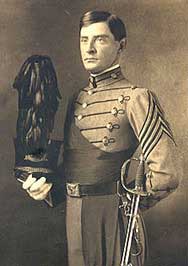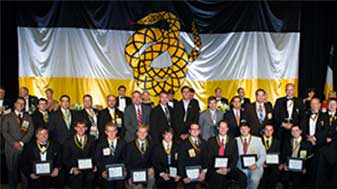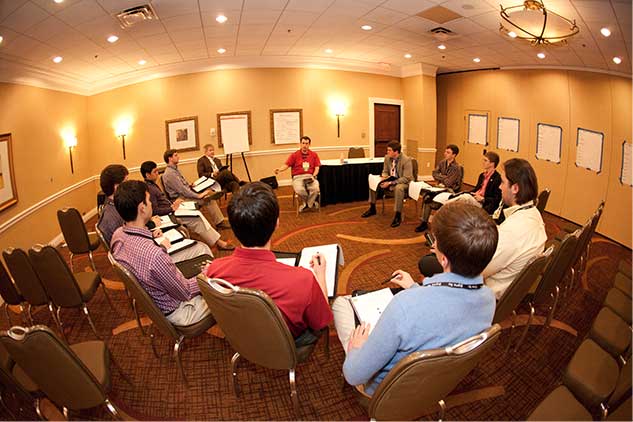History
Alpha Chapter Lives On

Alpha Chapter member Ora Baldinger at VMI
This column salutes a program born of the desire to keep Alpha Chapter alive forever.
Founder JamesHopkins expressed the wish for Alpha to live on and onwhen he spoke to men whom he personally initiated intothe revived Alpha Chapter in 1909. However, to hisdismay, VMI again banned fraternities in 1911, and the Chapter ceased to exist with the last graduating initiate in 1915 – just two years after Hopkins’ death in 1913.
Ora Baldinger, the leader of the newly revived Alpha Chapter, did not let Hopkins’ wish go unheeded. For over 50 years, he recalled Hopkins’ words and nurtured the hope that Alpha would once again be revived. In 1962, Hopkins’ wish and Baldinger’s action brought their hopes to reality.
This year is the 50th Anniversary of the Alpha Affiliate program, which was approved at the 1962 Grand Chapter in Pittsburgh. Each year it honors up to ten collegiate brothers in their senior year for outstanding achievement. Their names are added to the Alpha Chapter rolls, and each is given an Alpha badge number. The public induction is done each year at the Grand Chapter or College of Chapters.
How did this program come into being and why?
The Anti-Fraternity Movement
Over Sigma Nu’s history, a number of educational institutions have enacted anti-fraternity edicts for various reasons. Many of them were due to the secret nature of fraternities in general. During the early to mid-1800′s, there was constant wariness between college administrators and faculty and the students attending their institution. This was due in part to the more rigid nature of the administrators and faculty of that time and the willingness of students to push against higher authority. Over Sigma Nu’s history, a number of educational institutions have enacted anti-fraternity edicts for various reasons. Many of them were due to the secret nature of fraternities in general. During the early to mid-1800′s, there was constant wariness.
This is an example of a pull quote. You can use this style to draw emphasis to a paticular block of text.
This tension resulted occasionally in open revolts by the students against a perceived unfair system or policy. Administrators and faculty, unable to pierce the veil of secrecy of organizations such as fraternities, often assumed their meetings were places where plots were being hatched and carried out. If they couldn’t determine what was going on in the meetings, the next best option was to ban them entirely, as some colleges and universities did.
Military Schools
In the case of military schools there were additional reasons for banning fraternities. Due to the competition among fraternities, there was a desire to have your members take the top positions in the corps of cadets – thus providing bragging rights. Ultimately, this competition lead to abuses such as the promotion of men of one organization at the exclusion of other more qualified men, because they belonged to a competitor or no fraternity at all.
In addition, military schools typically had no fraternity houses; cadets lived together as almost one big “fraternity.” To build the entire corps into one cohesive unit, there was a concerted effort to eliminate subgroupings of cadets. Thus, most military schools took action by banning fraternities.
Alpha Chapter and VMI
VMI was no exception, and in the early 1880′s distrust of fraternities reached a climax. The unfavorable climate was exacerbated by the continuing antagonism between the cadets and the students of Washington and Lee University. While their relationship had never been particularly friendly, the escalating retaliations over perceived slights and injustices were getting out of hand. The fact that the two institutions shared a border with each other didn’t help the situation.

The 2012 Alpha Affiliate award winners with past winners at the awards banquet in Dallas last July.
On one occasion, the cadets charged the W&L students with bayonets and the students retaliated by throwing bricks and stones before retreating. Several retaliatory escapades took place under cover of darkness and caused serious damage to both institutions.
A secret organization arose at VMI called the “Molly Maguire, Fourteen” initially to seek revenge against W&L students. After a time, the group found a new cause to attack seeking to drive out an unpopular VMI professor. Just after the corps had returned from supper on December 2, 1884, a massive explosion from north of the cadet barracks shook the buildings, and the ammunition magazine that had formerly been there was no more. Someone had planted explosives in the magazine and when ignited had blown it to kingdom come. VMI administrators and faculty were not amused, and the negative feeling towards secret organizations reached a fever pitch. Unfortunately, fraternities were the only tangible “secret” organizations that could be identified so they bore the brunt of the punishment.

In June 1885, the Board of Visitors (VMI’s governing board) took action and inserted a clause in the matriculation pledge for new students that banned them from joining any secret society. After just sixteen years of existence, Alpha Chapter, along with all other fraternities on campus, was effectively shut down. Of course, there were still initiates returning to campus each year until 1887, but in that year the only returning initiate was Simeon Keaton Owens (Alpha #130). Upon his graduation in 1888, Alpha Chapter ceased to exist. Over the chapter’s existence from 1869 until then, there were 132 men initiated into Alpha’s ranks.
Revival
During the 1890′s and early 1900′s, VMI’s fraternity ban seemed to lack rigid enforcement. Although Sigma Nu was gone, Kappa Alpha Order operated on a sub rosa, or secret, basis. Sigma Alpha Epsilon also established a chapter and encountered no opposition – this encouraged a feeling that the ban had been, for all practical purposes, relaxed.